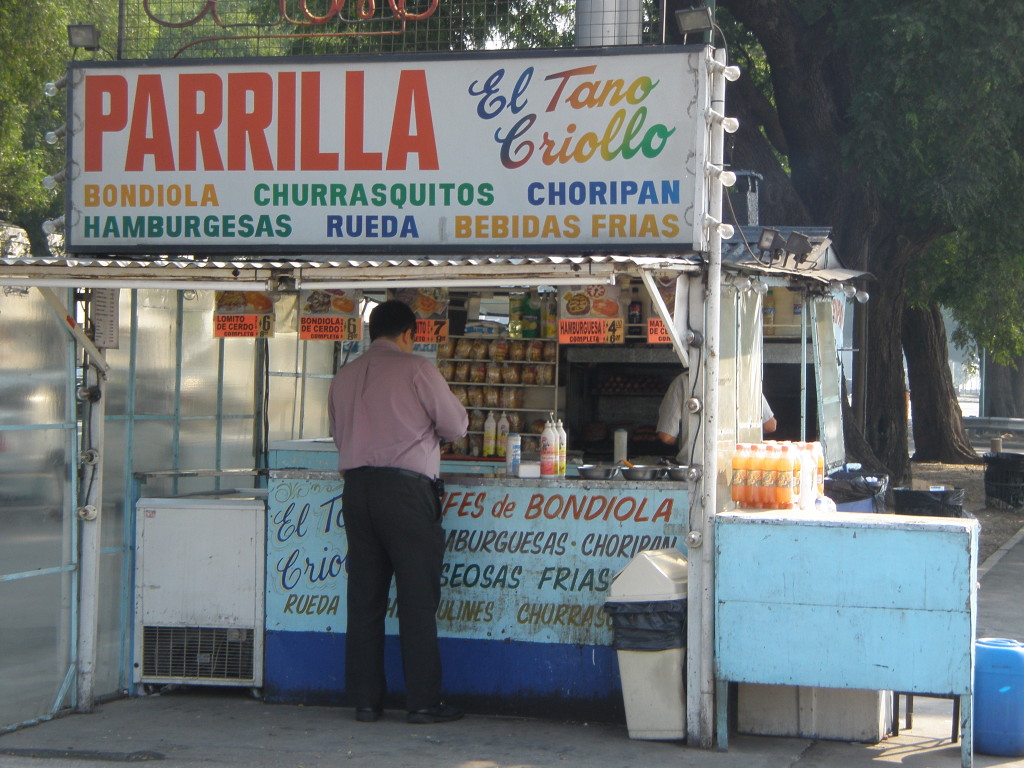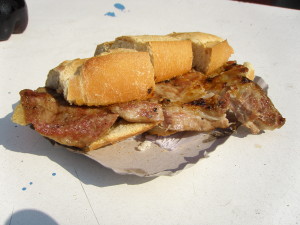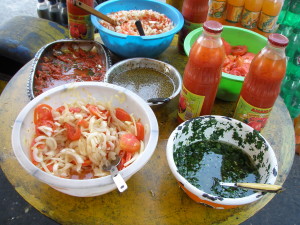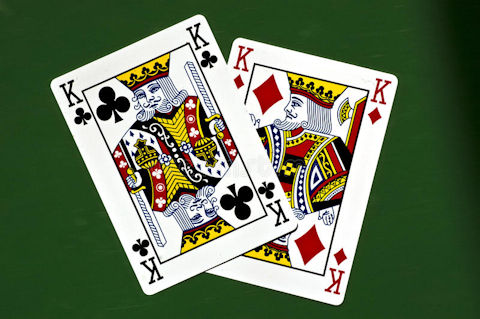ComoSur
South American Gastronomy
April 17, 2008
THREE CHEFS WEIGH IN ON (THE LACK OF) BUENOS AIRES STREET FOOD
by Patrick Heiger
[I’ve put the parts of this article written by others in blockquote italics. All the photos are mine.]

Although we want to believe that the streets of South America are as full of delicious street food treats like Mexico might be with tacos and tortas to go, it’s often the case that government regulations and strong social stigma have made the world of street food rather small, if almost nonexistent. While there are great empanadas to be had at the corner markets and holes in the wall of Buenos Aires, actually eating on the street is a near impossibility. Below, we talked with three of the city’s leading chefs, to get a little more insight, and some strong opinions, about where to go and what to eat if you absolutely must eat on the street. Let’s just say you’ll be craving some choripan by the time you’re done reading.
Dan Perlman | Casa Salt Shaker
I left New York City and moved to Buenos Aires before the food truck scene really took off. There was plenty of street food around – but it was more the smaller carts – early on in my time in the big apple it was hot dogs and wraps, though that gradually expanded into more and more offerings. When I travel the world, the first thing I do is start hitting the street food scene. So a decade ago, when I came to Buenos Aires, it was a surprise to find that it was near non-existent.
I would wander the streets forlornly, wishing for some sort of grilled or charred or even steamed something to nibble on. Something to keep the strength up. But, there was nada. In retrospect, and even today, I understand it. There are a couple of factors at work here. Buenos Aires streets are narrow, oft-times one wonders just how a car makes it down one, particularly if anyone else has parked along the side of the road.
But the biggest factor is, I think, cultural. Locals, porteños, don’t make a habit of standing while eating. Meals are not meant to be consumed while on one’s feet. They’re meant to be enjoyed, leisurely, preferably with a bottle of wine, a beer, a Fernet & Coke, or even just a soft drink. And they’re meant to be enjoyed with friends. The idea of standing, gulping something down and moving on is just not the style here. Even in bars people don’t tend to stand around drinking cocktails, they find a place to sit, to kick back and relax, to enjoy themselves.
 Now, that’s not to say that there’s absolutely no street food scene. Here and there along the streets you’ll find a stand offering garapiñadas, caramelized nuts, or perhaps a pancho, a hot dog. But little else. When it comes to outdoor eating there are two arenas where the scene exists, albeit limited. The first are street festivals, often run by the city’s cultural department in tandem with some local embassy. A section of three or four blocks, or a part of a local park or plaza, is blocked off, tents are raised, and ethnic food of one variety or another is offered up.
Now, that’s not to say that there’s absolutely no street food scene. Here and there along the streets you’ll find a stand offering garapiñadas, caramelized nuts, or perhaps a pancho, a hot dog. But little else. When it comes to outdoor eating there are two arenas where the scene exists, albeit limited. The first are street festivals, often run by the city’s cultural department in tandem with some local embassy. A section of three or four blocks, or a part of a local park or plaza, is blocked off, tents are raised, and ethnic food of one variety or another is offered up.
But what about local fare itself? Let’s face it, we all know that Argentina is known for grilled meat, and that ought to translate well to the outdoors, no? And it does, in two particular places, the Costanera Sur and the Costanera Norte. Costaneras are, literally, boardwalks, though these have no boards. They are two areas of the city that offer up a walking gastronome’s wet dream of sizzling carne. But we’re not talking food trucks, we’re talking what more or less amount to anchored kiosks.
You see, local ordinances don’t allow for the concept of a mobile kitchen, so to get around the letter, if not the spirit of the law, enterprising locals have taken trailer mounted grills, removed their wheels, and often pegged them in place with chains linked to concrete pylons. And thus, we have the north boardwalk, running along the river just north of the domestic airport, where closing on a couple of dozen parrillas, or grills, offer up local sandwich classics – stuffed with beef, pork, or sausages of one sort or another, and an array of condiments to adorn them.
And in the south, sandwiched itself between the upscale Puerto Madero Este and the Reserva Ecologica, the southern boardwalk. During weekdays, there’s a paucity of offerings – a few scattered grills with the same sort of sandwich fare, but on weekends and holidays, the zone blossoms into a cornucopia of food, with not only sandwiches, but temporary stands offering full meals, ethnic cooking, baked goods, pastries, and more. Families turn out to spend the day, nibbling, imbibing, and getting some sun.
 There is a new push for a food truck movement, and a few individuals are pushing hard, and there’s some support from the community and the gastronomy world. But, there’s an equally hard push back from those who don’t want to see their cultural mores with its stop and smell the roses feel, to change. Concerns about how food trucks will change the visual landscape, increased in litter and garbage, lines, problems with vermin, are all valid ones. But, things change, and we shall see what we shall see. In the meantime, I’ve adapted to my new home and know where to head if I need an outdoor food fix – the rest of the time, I’m content to put my feet up and relax, off-street.
There is a new push for a food truck movement, and a few individuals are pushing hard, and there’s some support from the community and the gastronomy world. But, there’s an equally hard push back from those who don’t want to see their cultural mores with its stop and smell the roses feel, to change. Concerns about how food trucks will change the visual landscape, increased in litter and garbage, lines, problems with vermin, are all valid ones. But, things change, and we shall see what we shall see. In the meantime, I’ve adapted to my new home and know where to head if I need an outdoor food fix – the rest of the time, I’m content to put my feet up and relax, off-street.
Narda Lepes | Boca de Lobo
Street food in Buenos Aires isn’t organized. It’s spontaneous, and in many cases borders on the illegal. Laws have changed recently towards grills with gas, but there are those that for moral and historical reasons would rather be fugitives than ever stop cooking over coals.Choripan is the king, by far. A few ingredients and some important variables ultimately make the experience great. It’s worth mentioning to visitors in these parts that one never orders a sandwich of chorizo or bondiola or beef or morcilla. On the street you have to order a chori-pan, bondi-pan, vaci-pan or morci-pan. If you don’t, you’ll be looked down upon.One of my favorites is “Lo Del Tío” that, because of the legal gray area, they took his cart away, but he set up a grill in the same space. It’s at Avenida Dorrego, between Lugones and Figueroa Alcorta.
 The Feria de Mataderos is the best place to try all the best in one place. Empanadas, choripan, churros, pastelitos de membrillo and sweet potato, torta frita, tamales, humitas, and obviously meat, meat, and more meat. It’s in Mataderos, so they celebrate on the days when the butchers would close down the area. It’s a one-of-a-kind, real place. It’s a touristic zone set up for those who miss their home in the country’s interior, in the countryside. There’s tradition, folklore, music, horses, maté, and a lot of movement, all brought together with pride.Early some mornings you can see, on some corners, people selling tortas or bread with lard on the grill with really sweet coffee out of a jug. There’s one on the corner of Maria Campos and Santa Fe.And to get a true taste of what it’s like to eat on the street with the most beautiful views and alleyways of the city, go to the Costanera Sur, note South, not North. North is for restaurants. Go South. There, by instinct and feel, you’ll be able to decide which is the best street food stand. They’ve been there for more than 50 years. Obviously, look for the one with the longest line and the most smoke.
The Feria de Mataderos is the best place to try all the best in one place. Empanadas, choripan, churros, pastelitos de membrillo and sweet potato, torta frita, tamales, humitas, and obviously meat, meat, and more meat. It’s in Mataderos, so they celebrate on the days when the butchers would close down the area. It’s a one-of-a-kind, real place. It’s a touristic zone set up for those who miss their home in the country’s interior, in the countryside. There’s tradition, folklore, music, horses, maté, and a lot of movement, all brought together with pride.Early some mornings you can see, on some corners, people selling tortas or bread with lard on the grill with really sweet coffee out of a jug. There’s one on the corner of Maria Campos and Santa Fe.And to get a true taste of what it’s like to eat on the street with the most beautiful views and alleyways of the city, go to the Costanera Sur, note South, not North. North is for restaurants. Go South. There, by instinct and feel, you’ll be able to decide which is the best street food stand. They’ve been there for more than 50 years. Obviously, look for the one with the longest line and the most smoke.
Fer Rivarola | El Baqueano
Buenos Aires isn’t a city that’s widely known for it’s street food, but there are a few places that have survived and dish up informal food. These include the parrillas on the Costanera Sur and Norte that have received some government reforms that have transformed them into nice-looking stands that serve up American-style food, but they’ve lose the essence of what they were doing originally. Now, for reasons of functionality, they’ve taken out their coal grills and changed them for gas. Generally speaking, and from what I’ve seen and experienced in other cities throughout Latin America, street food is a true reflection of the basic food from the small towns, closer to what people want and need. This is something that still hasn’t taken off yet in Buenos Aires.
Surely, a list of the top five street foods should be topped by a great empanada filled with meat, something that we can only dream of, because these are difficult things to find in the streets. You can find some vendors in the micro center selling this filled treat, screaming that they’re selling homemade empanadas, but those have a bit of a dodgy reputation, for sure.
I also love going to the Costanera and eating a great “radioactive” choripan, with a cold beer, on the banks of the river, something that even Kamilla Seidler from Gustu succumbed to when she came to participate in our Cocina Sin Fronteras. But, be careful, don’t go crazy with the dressings or extras that the stands offer, as they can be dangerous to your stomach’s health.We also go crazy for a great milanesa sandwich, and lucky for us, there’s a stand in the north of the city that has a great reputation called “Pequeño Demonio” where, without a doubt, you can eat the best bondiola sandwiches in the city, with great bread, great meat, and a shady corner so you can take a break.Another classic in Palermo is “El Puestito del Tío,” he’s been there for years, and you can get great morcipan, vacipan, and other great combinations of grilled meats wrapped in bread.
Lastly, for the more daring, during the early mornings in Retiro you can try chipas, a typical mesopotamian dish, which is a kind of cheesy bread made from mandioca starch, which for years has been the staple of the Guaraní villages.





 “I am here to make an announcement that this Thursday, ticket counters and airplanes will fly out of Ronald Reagan Airport.” –Washington, D.C., Oct. 3, 2001
“I am here to make an announcement that this Thursday, ticket counters and airplanes will fly out of Ronald Reagan Airport.” –Washington, D.C., Oct. 3, 2001


 The first book I opened is the cookbook from the chef and staff of the Millennium restaurant in San Francisco. Aptly enough, not only for the restaurant but for the age we’re living in, the book is called The Millennium Cookbook; Extraordinary Vegetarian Cuisine. And it is. Extraordinary. First, the book is beautifully designed. Eye-catching photos, both color and sepia-toned, are liberally placed throughout the book. The graphic layout and color choices for text are equally enticing. Secondly, the book is a pleasure to read. The authors start by noting that their readers undoubtedly have different motivations for picking the book up – and all are equally valid.
The first book I opened is the cookbook from the chef and staff of the Millennium restaurant in San Francisco. Aptly enough, not only for the restaurant but for the age we’re living in, the book is called The Millennium Cookbook; Extraordinary Vegetarian Cuisine. And it is. Extraordinary. First, the book is beautifully designed. Eye-catching photos, both color and sepia-toned, are liberally placed throughout the book. The graphic layout and color choices for text are equally enticing. Secondly, the book is a pleasure to read. The authors start by noting that their readers undoubtedly have different motivations for picking the book up – and all are equally valid.  The second book I approached with trepidation. Heaven’s Banquet; Vegetarian Cooking for Lifelong Health the Ayurveda Way already had the ring of dogma and brown, mushy food. Happily, my fears were unwarranted. The book certainly contains whole sections devoted to spirituality and vegetarian cuisine, and it is peppered with quotes and quips from spiritual texts. However, there is an easy-going, at times almost tongue-in-cheek approach to the presentation of the food and its relationship to life.
The second book I approached with trepidation. Heaven’s Banquet; Vegetarian Cooking for Lifelong Health the Ayurveda Way already had the ring of dogma and brown, mushy food. Happily, my fears were unwarranted. The book certainly contains whole sections devoted to spirituality and vegetarian cuisine, and it is peppered with quotes and quips from spiritual texts. However, there is an easy-going, at times almost tongue-in-cheek approach to the presentation of the food and its relationship to life.




